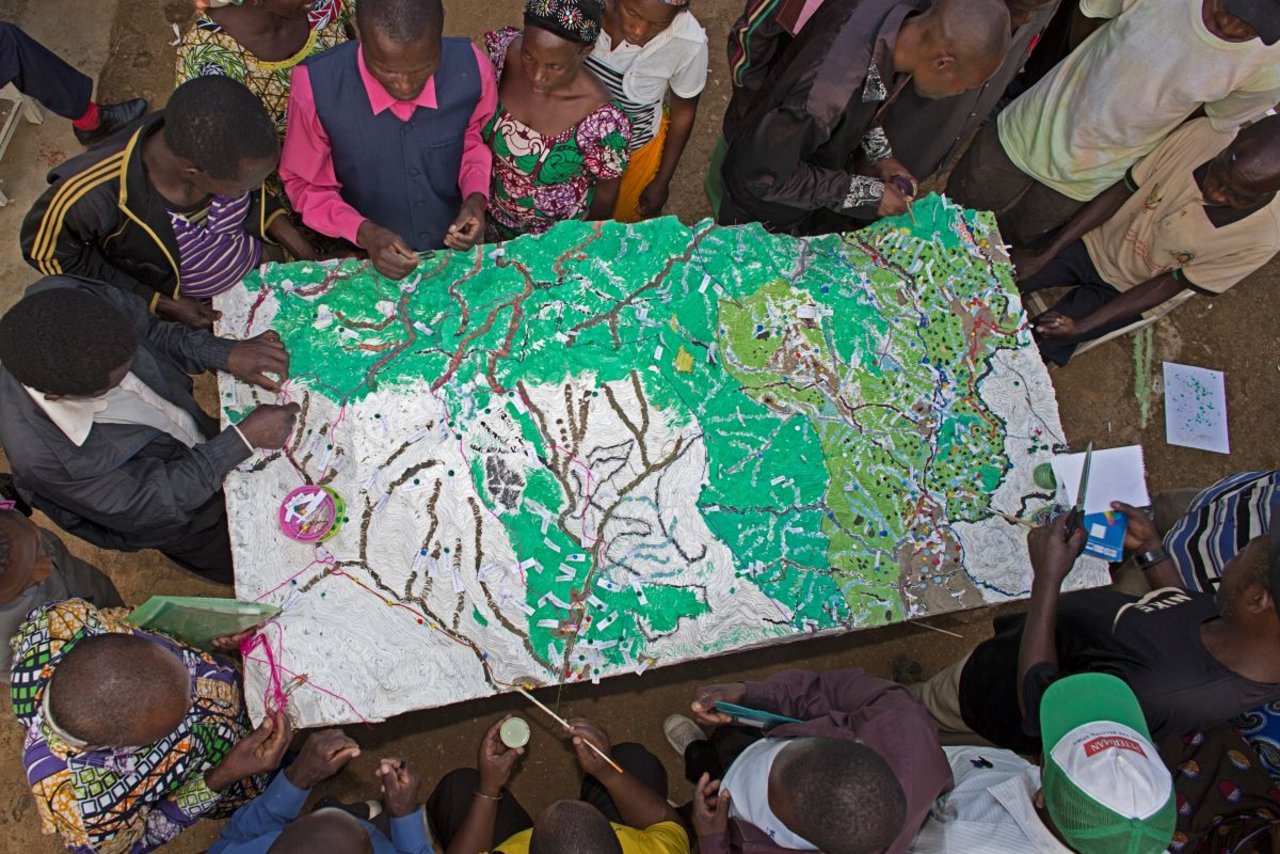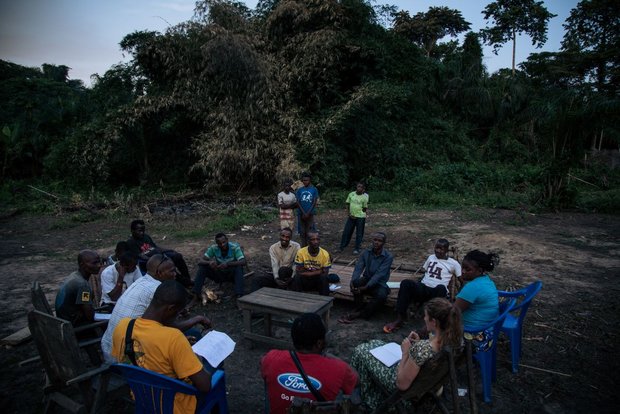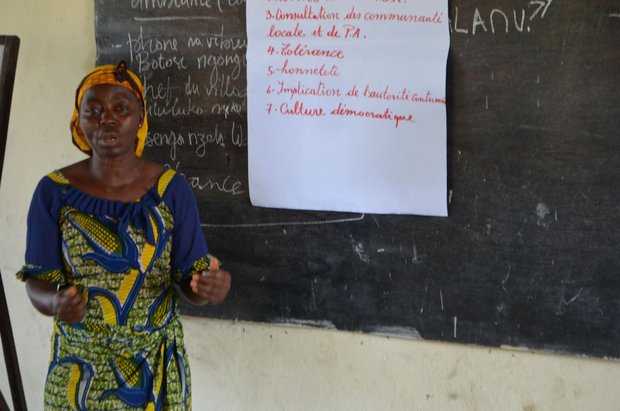Decolonizing Expertise: Reflections on Power, Knowledge, and Governance in International Organizations (IOs)
By Marine Gauthier, Graduate Institute, Geneva

This story has also been published on the EADI Blog
Listen also to the podcast with Marine
A Personal Reckoning with Expertise
My engagement with international development has always been entangled with postcolonial sensitivities—an awareness shaped by my Belgian family's colonial past, my academic training on North-South relations in environmental governance, and my own professional trajectory which started in Senegal as the only white development worker in a national NGO. Yet, despite this awareness, I found myself deeply embedded in the very structures I sought to critique. Early in my career, I was granted the title of “expert” within international NGOs and international organizations (IOs), consulting so-called “non-experts”, “civil society representatives”, or “local communities” in processes labeled as ‘participatory.’ But even then, I sensed the asymmetry of power: the sole title of “expert” was not neutral. I was granted a dominant position in comparison to non-experts. Soon I ended up wondering whether I was maintaining colonial hierarchies rather than dismantling them. This unease led me to shift from practice to research, seeking to critically examine how expertise is constructed, operationalized, and contested within IOs.
The Role of Expertise in International Organizations
International organizations thrive on expertise. It is through expertise that they claim legitimacy, formulate policy, and govern transnational issues. While expertise may be seen as a necessary mechanism to ensure efficiency, predictability, and adherence to international standards, it is profoundly embedded in existing power dynamics. Expertise provides a structured way to navigate complex global challenges, from climate change to conflict resolution. Asking who structures this navigation—and from where—is a crucial step in understanding its postcolonial roots.
More and more, we see pairs of “international” experts and “national” experts working together. The wording barely hides the postcolonial hierarchy: the “international” expert comes most often from a former colonial power, while the “national” expert is from the country where the development project is implemented, an ex-colony. Their knowledges are ranked: the “international” is recruited to provide guidance to and review the work of the “national”, expected to offer contextual details. Yet, the national consultants are often part of the international system with which they establish more intimacy than with the local one..
The operationalization of expertise often relies on standardized methodologies that privilege Northern scientific knowledge, sidelining localized understandings of problems and solutions. Mandatory expert-driven frameworks, such as safeguarding policies or risk assessments, serve to homogenize diverse realities into categories legible to global governance institutions, reinforcing asymmetries in knowledge production. Hence, expertise is not merely technical; it is profoundly political. The knowledge frameworks privileged by international organisations (IOs) tend to reflect technocratic rationalities that align with global governance norms while sidelining alternative epistemologies, particularly those of Indigenous and local communities.
When working with IOs, I learnt to master the art of using expertise tools: checklists, forms, templates. Ostensibly neutral, such tools dictate how projects are designed, often predetermining what counts as wishful action and what is deemed a good strategy. International development programming is participatory to a certain extent. We are no longer in the 1980s, when programmes would be designed in offices far away from "the field," often making them quite irrelevant to local realities. Today, participation is a central principle. However, participation is managed by experts—they decide what participation is relevant, where, and when. And when it comes to so-called technical issues, such as biodiversity, soil degradation, or environmental impact assessments, they (we?) are the ones we rely on. Expertise conveys a veil of superior knowledge which is perceptible even when speaking with the primarily concerned. Experts in International Development would go “in the field” and consult “beneficiaries”’. How many times in a village was I answered, when asking people about their situation, "we don't know, you're the expert"? This reveals a deeply ingrained dynamic where non-expert knowledge is constrained to a secondary position. At best, it can inform, complement, or corroborate expertise.
The Epistemic Constraints to Decolonizing Expertise
Despite growing discourse on the need to decolonize international development, deep-seated bureaucratic and political legitimacy constraints impede meaningful change. The hierarchical nature of IOs, where decision-making is centralized and often influenced by donor priorities, limits the space for alternative knowledge systems to be recognized and institutionalized. Bureaucratic structures within IOs favor standardized processes over context-sensitive approaches, limiting opportunities for meaningful participatory engagement. Even the discourse on adaptive management is often framed in a way that emphasizes technical learning and managerial efficiency rather than genuinely opening space for participatory decision-making.
Bureaucratic and donor-driven incentives prioritize accountability in narrow, quantitative terms, which can stifle the flexibility that adaptive approaches claim to promote. The core goal of post-World War II international organizations and their subsequent development programs—maintaining peace—tends to prioritize stability and predictability over radical change. Bureaucratic inertia ensures that once a system of expertise is in place, it becomes self-reinforcing, as policies and funding mechanisms are built around it. Even when local voices are included, it is often within predefined frameworks that reinforce existing power asymmetries rather than disrupting them. For instance, Social and Environmental Safeguard Risk Screening relies on standardized forms, typically featuring multi-page checklists packed with binary yes/no questions. Framed on the basis of international agreements and best practices, these questions are later referenced through numerical codes like “issue 1.13” or “issue 3.4”. For so-called “non-experts,” such as community representatives or government officials, navigating these forms can be an exercise in bewilderment. Their input is effectively constrained by the obscure format and rigid questioning.

Take, for instance, the classic: “Is the project located near a critical habitat?” A simple yes or no is required—never mind the minor details of what qualifies as “near” or how exactly one determines what counts as a “critical habitat.” At this point, the expert becomes absolutely indispensable, serving as the translator between the cryptic language of the form and something comprehensible to the masses. Of course, whether the input is ultimately incorporated in the form depends on whether it is deemed “relevant”—a decision left, unsurprisingly, to the expert. New issues become framed as technical challenges, which do not necessitate less Northern expertise but, paradoxically, more.
Real change within IOs is possible, but it requires more than just incremental adjustments—it demands a fundamental shift in how expertise is conceived and practiced. While there are growing initiatives to include Indigenous knowledge and participatory methodologies, these efforts are often constrained by the overarching institutional logic that privileges technocratic approaches. For meaningful decolonization, IOs must go beyond consultation and actively transfer decision-making power to local actors. This means not only recognizing diverse forms of knowledge but also reshaping governance structures to allow for genuine co-production of expertise. However, achieving this requires persistent advocacy, internal resistance from within IOs, and the political will to dismantle entrenched power hierarchies.
Pathways to Decolonizing Expertise
This does not necessarily mean abandoning expertise altogether but rather reimagining it in ways that are more inclusive and reflexive. Some pathways forward include:
Prioritizing Local Knowledge Over International Expertise
Why should international experts be presumed to know more? How relevant was I conducting a risk assessment after spending only three days in Port-au-Prince—without even being allowed to leave the hotel or the office due to security restrictions? Working with people who actually live in the area and possess lived experience provides far greater insight than relying on professionals who merely understand what donors expect from them.
Moving Beyond Tokenistic Participation
Participatory methodologies must go beyond superficial consultations and genuinely redistribute authority. This means co-developing knowledge with affected communities, allowing them to define the terms of engagement rather than simply responding to pre-determined frameworks. True participation requires more than allocating additional time in project design—it should begin from a blank slate, with no pre-set agenda. My dream would be to see more ‘no-project’ consultations considered, where communities articulate their needs before any development intervention is designed.
Amplifying Local and Marginalized Voices in Decision-Making
Decolonizing expertise requires institutional mechanisms that empower local actors to lead decision-making processes rather than serve as informants for external experts. This involves transferring decision-making authority to local governance structures and embedding Indigenous epistemologies within project design. However, current efforts often remain superficial due to limited time, constrained budgets, and pre-existing project assumptions which local actors are merely asked to validate or amend.
Bridging the Gap Between Academics and Practitioners
Academia and practice often operate in parallel worlds—researchers critique development interventions, while practitioners navigate real-world constraints. Collaborative knowledge production, where scholars and practitioners co-design research, can bridge this gap. However, such collaboration must be undertaken with acute awareness of power dynamics to avoid reinforcing the same hierarchies that decolonial efforts seek to dismantle.
Rethinking the Paradigm of Consultations
Too often, consultations are framed as a process of securing and formalizing consent rather than fostering meaningful dialogue. Rarely is sufficient time allocated to genuinely listening. I often found myself simply sitting and listening, asking the most open-ended questions possible—though even then, I questioned how much my own biases shaped the framing of those questions. I began stating upfront that I was not an expert, but rather a conduit—a pen to transcribe and translate their knowledge into bureaucratic jargon. Yet despite these efforts, I sometimes wondered: should I even be there at all? To this day, I do not have a clear answer.
Expertise not as a tool of governance but as a site of negotiation

While these pathways offer a vision for transformation, I remain cautious about the challenges ahead. International organizations are deeply entrenched in epistemic traditions that resist fundamental change. Even when local knowledge is incorporated, it is often absorbed into existing frameworks rather than allowed to challenge them. Moreover, structural constraints—donor priorities, bureaucratic inertia, and geopolitical power dynamics—continue to shape what is considered ‘valid’ expertise.
Decolonizing expertise in IOs demands more than just diversifying expert pools; it requires dismantling the epistemic hierarchies that sustain the status quo. It means creating spaces where knowledge is co-produced rather than extracted, where expertise is not a tool of governance but a site of negotiation. My own journey—from practitioner to researcher—has been one of confronting the contradictions in my own position, but also of imagining possibilities for a more just, inclusive, and reflexive global governance. If we are to truly decolonize expertise, we must be willing to fundamentally rethink not just who is considered an expert, but how expertise itself is conceptualized and deployed. Decolonizing expertise, therefore, is not a destination but an ongoing struggle—one that requires constant reflexivity, humility, and a commitment to unsettling power.
Marine Gauthier is a PhD researcher in International Relations at the Graduate Institute Geneva, where her research critically examines global climate governance through lenses of epistemic justice, power relations, and reflexivity within International Organizations. Prior to her academic engagement, she spent 15 years as an “expert” in international development, specializing in environmental and social safeguards, climate policies, and indigenous peoples' rights. Her work has spanned Southeast Asia, West Africa, and predominantly the Congo Basin in Central Africa, coordinating stakeholder engagement in initiatives such as REDD+, nature conservation, and climate adaptation programs. Her academic and professional pathways have intersected through teaching roles, including advocacy strategies, political communication, and human rights at institutions such as La Sorbonne, complemented by capacity-building sessions for professionals and students across Europe and Africa.

